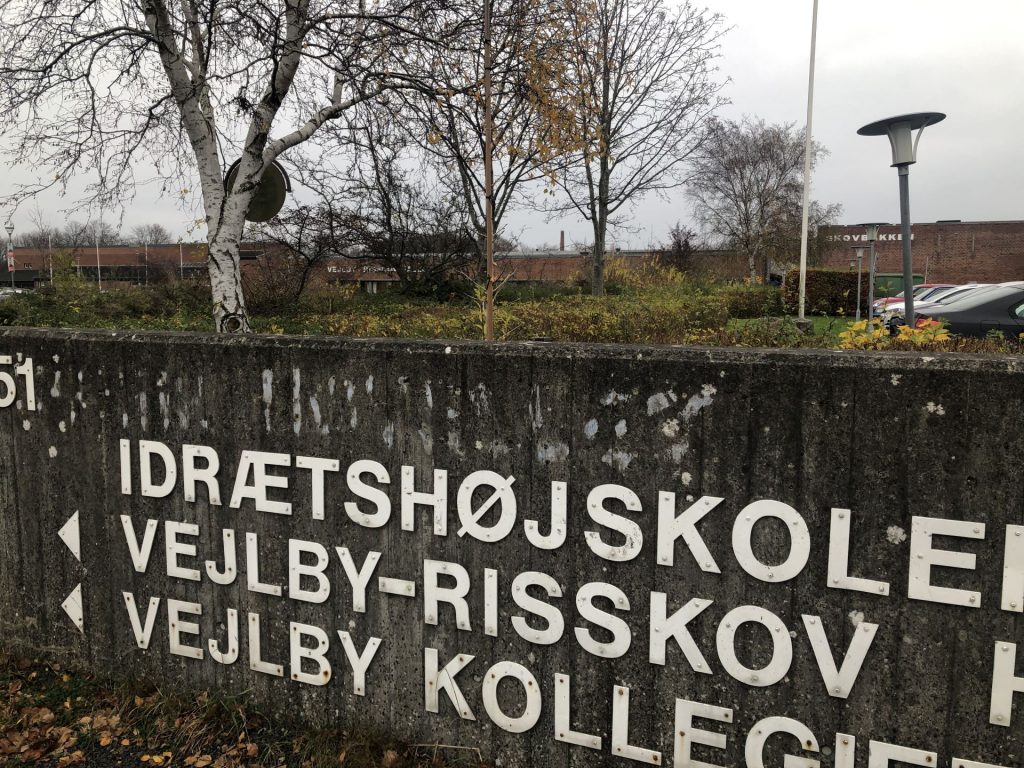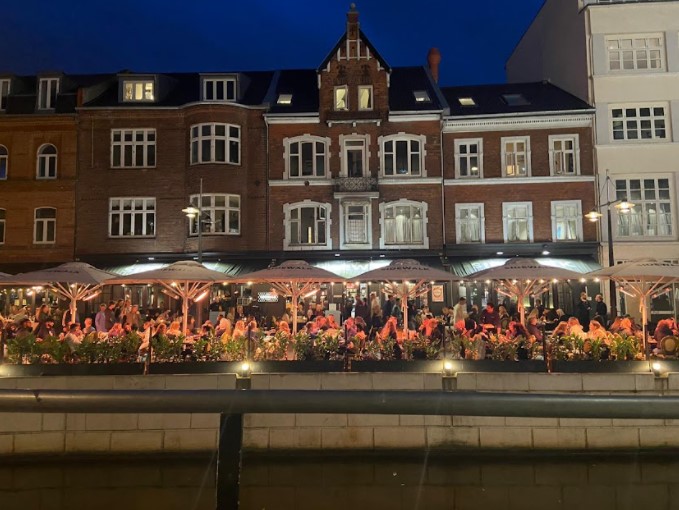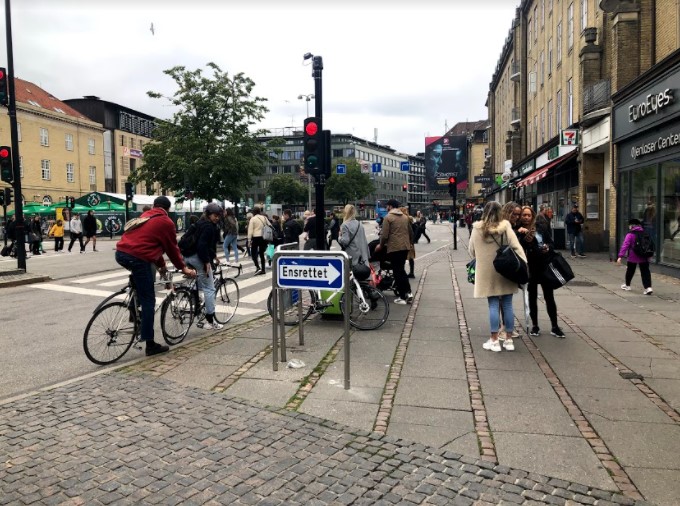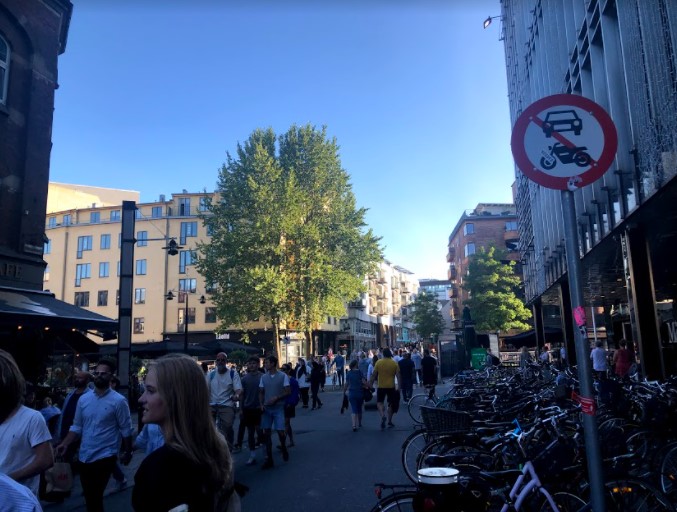‘As people come into the polling stations, Danes reflect in the importance of local government and democracy’
By Gabrielle Bunton on November 16, 2021 at 11:42 p.m.
(Target Audience is anyone from all across the world)

(Photo Credit to Gabrielle Bunton: The sign outside of Vejlby-Risskov Hallen)
Vejlby-Risskov Hallen in Aarhus, Denmark has had many great moments. From having Jimi Hendrix, The Rolling Stones and Pink Floyd grace the stage, it now has also become a home to cast your vote.
As people make their way through the parking lot, they are met with the giant smiling faces of candidates on posters that can be seen all around the city. They clutch their ballots in their hand as an aura of calmness surrounds the scene. People calmly make their way into a room in the giant arena making a line. While some take a look at the big posters with the names of all candidates on the walls, others continue to get in line to put their ballots in the box.
For some it’s just a casual election day but for Thomas Sudergaard, student at Aarhus University, being there to vote was more than just electing people but to help his family. “Some people in my family have had medical issues in the past. I have seen how health care works in other countries, so I’m grateful to live here and be able to vote for people who can help it,” said Sudergaard.
(Photo Credits to Gabrielle Bunton: People wait inside the Vejlby-Risskov Hallen in Aarhus, Denmark to cast the ballots for Election Day on November 16, 2021)
November 16 marks Election Day for Denmark for their local governments. Danes
come into various polling stations across their five regions and 98 municipalities to vote for local and regional councils. These elections must be held every four years on the third Tuesday of November according to the Local and Regionals Election Act.
The Danish government has a parliamentary democracy or Folketing with multiple parties, ministers, a queen and more. Democracy is a big thing in Denmark with the country being built on one of the world oldest constitutions, the Danish Constitution of 1849, which is over 170 years old, according to the official website of Denmark.
VIDEO LINK: https://youtu.be/QTS0C62MO9w
“I think we have a good democracy and it shows. Danish culture is very stress free because of how we are set up as a country. We believe in our democracy. We believe in our democracy,” said Sudergaard.
The people take advantage of some of the fundamental principles in democracy with voting. According to Election Guide, Denmark has a average voting turnout of 79.72% with 4,219,537 registered voters. Voters must be 18 years or older, a residence in one of regions or municipalities, a citizen of a EU member state, citizen of Iceland or Norway, a citizen of a non-EU member state (must have resided in Denmark for a period of four years), according to the Danish Parliament website.
People can vote from a multitude of parties with even more members. This year 19 parties with over 180+ candidates among the various parties. A list can be found here (in Danish).
As an foreigner here, I noticed that when it comes to voting, not much propaganda was made to encourage people to vote. For example, in America you will see commercials, clothes, posts on social media and much more to influence people to vote. In Denmark people seem more willing to vote rather than in America where it seems like a life or death situation. It was way more relaxed here.
I also noticed that Denmark has strong local governments that many people trust. In America, now more than ever, people do not have must trust in our government. Denmark is among the countries with the lowest level perceived corruption in the public sector, while in America public trust in government remains low. Only about one-quarter of Americans say they can trust the government in Washington to do what is right “just about always” (2%) or “most of the time” (22%), according to Pew Research.
(Photo Credit to Gabrielle Bunton: A list of all candidates and parties up for the local and regional election)
For Danish citizens, election day is pretty casual compared to others. For example, America has had a lot of tension among political parties that has made its way into the people. The country has been in the forefront of many bold displays that people have made against the government such as the Capital Riots.
Voter, Nana Skaidantcis, says it is always a breeze to vote. “It’s pretty easy. You just go in and put your ballot in the box. There are really no problems when voting here to be honest,” said Skaidantcis.
As stated by the City of Aarhus, when the elections are closed and final, the elected local and regional council will take office on January 1st of the following election year. The previous members will resign on December 31st in the election year.
The regional councils or Regionsrådet focus on healthcare (hospitals etc.). psychiatry, social services, and regional development for all five regions with each council having 41 members. Local councils focus more on the community with sports, infrastructure, housing, childcare, schools, culture and mainly the everyday life for people within the municipality.
Another Josephine Lusty, says that voting in these local elections helps everyone in the community. “People are able to vote for whoever they want without any pressure. People are able to exercise their right in democracy which is very important,” said Lusty.
Even though these elections happen every four years, people can practice democracy in their everyday lives like political organizations, attending board council board meetings, joining sports organizations and more.
“To me democracy is more than just voting for people. We are doing things that will affect ourselves, everyone around us and everything that we deal with in our country. Voting is a privilege that should be taken seriously by everyone,” said Lusty.
For more on voting in local and regional elections in Aarhus go to https://international.aarhus.dk/live/elections/local-municipal-and-regional-elections/#1. For information on voting other municipalities or regions got to their official websites.



